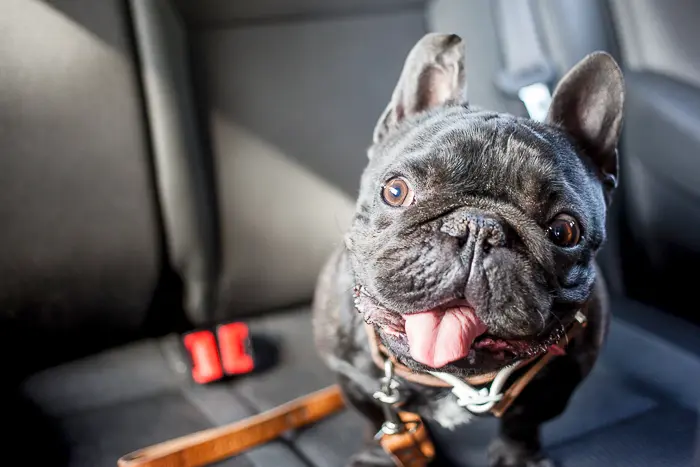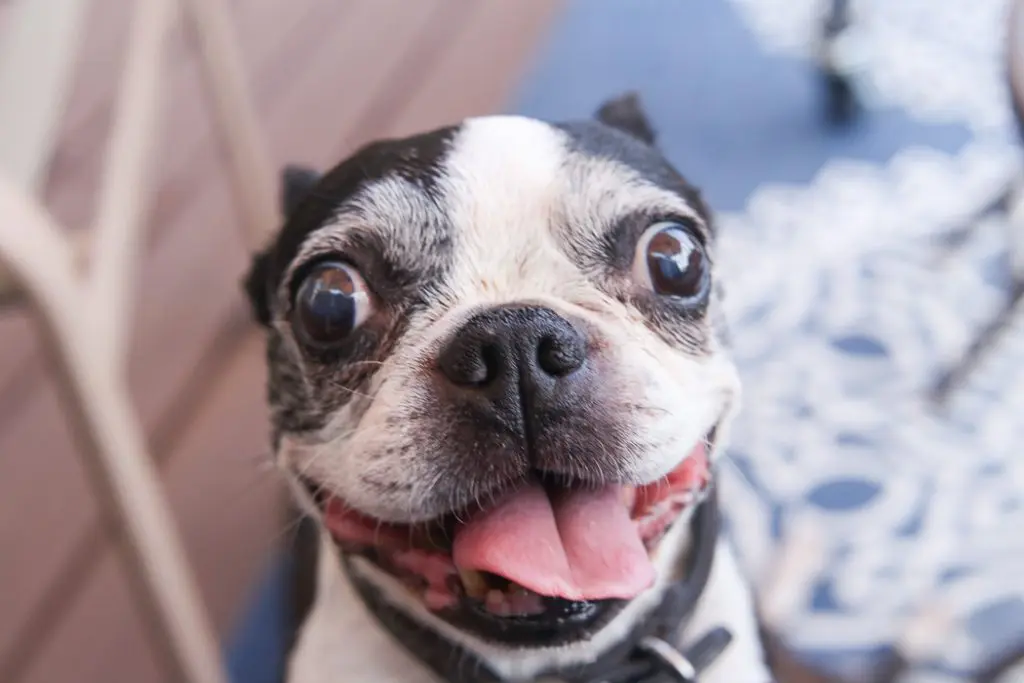Every dog has their own personality, behaviors, and actions, such as breathing. Many dogs breathe fast for many different reasons. So why is your dog breathing fast?
Dr. Jess breaks down the reasons why your canine companion is likely to breathe fast.

What is Fast or Rapid Breathing?
Fast breathing in dogs is typically an open-mouthed way of respiration in dogs.
What fast breathing looks like: Your dog's tongue many droop out of one side of their mouth and their breathing may be quicker (also known as tachypnea) and than when not breathing rapidly.
Many times the dog will slobber while breathing faster and many times the rapid breathing comes with airy sounds of your dog taking big breaths of air in and out.
Why Do Dogs Breathe Fast?
Dogs breathe fast for many reasons. The reasoning may be good or bad, pain or excited, or could be anything from hot or overheated to anxious dog problems.
Open-mouthed respiration is a normal canine behavior.
But let me explain a few of the most common reasons why your dog may be breathing faster than normal….

#1: Breathing Fast is a Way to Exchange Oxygen.
Dogs and puppies can breathe fast just like normal breathing in the sense that it also allows oxygen into the dog's bloodstream and helps to remove carbon dioxide during the oxygen-carbon dioxide exchange in the capillaries in the lungs.
Breathing faster can be just like normal breathing, but more rapidly – allowing even more oxygen and carbon dioxide to be exchanged in less time.
#2: Breathing Fast to Lower Body Temperature.
Breathing faster can also be due to lowering the body's temperature.
Breathing, espcially faster breathing, can be a cooling mechanism for the dog.
Faster breathing is necessary because dogs do not have an effective or efficient system of sweating like most mammals do, including humans.
Dogs lack the number of sweat glands that would be necessary to help reduce excess heat and cool their bodies off effectively.
Dogs do have sweat glands in a few places, such as the bottom of their feet.
Instead, dogs cool their bodies using the evaporation of moisture from their mouths and tongue during panting and heavier breathing, and by exchanging the hot air of their lungs with cooler external air.
Taking faster breaths allows your dog to release heat in the form of hot breath, and exchange it for cooler air from the environment (as long as that environmental air the dog is breathing in is LESS than 102*F!).
When a dog becomes hot, let's say from exercising, they will breathing heavier and faster (tachypnea) to try and cool their bodies down, much like the way humans breathe faster when doing aerobic exercise!
The hotter a dog becomes, the more intense the panting becomes, deeper and faster breathing.
Dogs will start to breathe heavier and faster when they get even a little bit warm and will breathe harder and faster the warmer their bodies get, no matter the reason why they were originally panting.
For short-faced dogs, like bulldogs, Boston terriers, boxers, and pugs, they can become hotter much more quickly because of their face shape, also known as being brachiocephalic – or having a really cute smushy-face with all those adorable wrinkles!
Breathing deeper, harder, or quicker may also mean that your dog is thirsty, so make sure to give your pet clean and fresh water regularly.

#3: Breathing Fast out of Excitement or Happiness:
Faster breathing may simply be a sign of happiness in your dog. Your dog may breathe deeper and faster when you come home from work because they are excited to see you, for example.
Your dog's tail will usually be wagging in a happy way. Your dog's body and facial features will be relaxed with their eyes bright and happy.
Once the situation calms down, so should the increased respiratory rate (one breathe in and one breathe out is equal to one full respiration).
The increased breathing rate will slow down eventually once your pup's excitement subsides.
Continued mild panting with an open mouth and bright eyes is normal in a relaxed, content dog.
In fact, many people consider this to be their dog's “smile”.
#4: Breathing Fast Due to Stress:
Faster than normal breathing may have nothing to do with happiness or body temperature.
In fact, it may be out of a different type of excitement – and not the fun kind – the stressful type of excitement.
Many dogs will start to breathe faster when they are excited by fear, anxiety, or stress.
Fireworks, car rides, separation anxiety (cage or kennel anxiety for example), vet visits, moving or moving boxes, guests in the home, vacuum cleaners, and other stressful events are very common reasons why dogs breathe fast due to stress.
Look at your dog's body language to help you determine if your dog is showing signs of distress.
Some of these distressed body language patterns include but are not limited to:
- shaking or shivering,
- hiding or crouching,
- ears down,
- tail down or tucked between legs,
- drooling accompanying the panting,
- no eye contact,
- head turned away,
- etc.
Remove your dog from the stressful or scary situation as soon as possible and you will likely see the faster breathing resolve itself.
#5: Breathing Fast From Pain or Discomfort:
Similar to the point above of breathing fast out of stress, your dog will likely pant out of pain or discomfort – it is a very real and common reason why dogs breathe fast.
In fact, it is one of the many signs that us vets use to help us determine if a dog is hurting!
Once your dog reaches a certain pain or discomfort level, they will most likely start to breathe faster. The breathing can become harder and faster (tachypnea) the more intense the pain becomes or the longer that the discomfort is there.
Also, breathing faster can be part of a dog's allergic reaction from an ingested (or eaten) or topical (on the skin) substance that your dog is allergic too.

Where Do Dogs Breathe Fast?
Anywhere and everywhere. Anywhere where a dog can be – that's a place where they could potentially start breathing fast.
Can Breathing Fast Be A Negative Sign?
Breathing excitedly is normal. However excessive, faster breathing is not normal but somewhat common unfortunately in the vet clinic's emergency room.
That's why it's so incredibly important to check in with your veterinarian to know what’s really going on with your dog if you have concerns over their breathing.
If your pup's breathing is making a raspy or wheezy sound, they may be having difficulty in breathing.
So if your dog’s breathing pattern seems excessive compared to normal you MUST contact your local vet immediately to discuss the details – they may need to be seen immediately.
If your dog is lying on their side and breathing fast and doesn’t want to get up or can’t catch his breath or is not responding to things that they normally would respond to, then they may be experiencing a medical emergency.

Breathing Fast Due to Medical Concerns:
Here are just a few common medical issues associated with dogs who are breathing fast:
- Heat Stroke or Fevers: Dogs with an apparently high fever or higher body temperature may breathe fast to help lower their body temperature through the same process as is explained above.
- Dogs with certain metabolic syndromes and diseases such as Cushing's disease, which is a condition caused by excessive production of the stress hormone cortisol, can cause excessive breathing. Remember the whole bit above about stress and panting??? M-hmmmm!!!! Other metabolic issues can be seen with the same sign of panting.
- Motion sickness, which mostly affects puppies, but sometimes dogs never grow out of it. Medications and training can help with motion sickness.
- Heart Failure – may breathe heavy due to having a hard time breathing during easy exercise or may even have a cough due to excess fluid buildup in the chest.
- Foreign bodies in respiratory tract, such as a stick or dog toy stuck in the respiratory tract.
- Injuries to chest cavity, such as stick injuries
- Stomach bloat may cause your dog to breathe faster due to extreme pain and the decreased lung volume (because the stomach has expanded and therefore there is less rom inside the dog for the lungs to expand because of the over-inflated stomach), and sometimes in preparation for vomiting. This is an emergency and your pet should be evaluated immediately if they are vomiting or dry heaving and breathing harder and faster.
- Respiratory tract or Lung conditions such as pneumonia or bronchitis (inflammation of the bronchioles, the branches of the respiratory system that lead air into the lungs), making it harder to breathe
- Lung masses and tumors, which can cause there to be less room in the lungs for air exchange.
- Anemia, low red blood cell count. Red blood cells deliver oxygen to the body’s organs. With lowered numbers of these cells, your dog must breathe faster or deeper, or both, in order to get the oxygen into their system that they need to function properly.
- Toxins/Poisonings may cause faster breathing as well as many other signs
- Excess weight can cause your dog to breathe heavier and faster on a regular basis.
Labored Fast Breathing:
Labored breathing, aka Respiratory distress, aka dyspnea, is a medical emergency.
It is characterized by strained or laborious respiration or attempts at breathing in and/or out.
This may be accompanied by sounds of distress like crying or whining, wheezing, or whistles from the nostrils or windpipe due to blockage either by a foreign body or from inflammation of the respiratory tract.
If at any time you see that breathing is extremely intense or has been going on for a very long period of time and cannot be explained, you should get your dog to the nearest veterinarian immediately.
It's always best to play it safe and let your vet check things out. When in doubt, take your dog to the veterinarian for medical attention.
At the very least- contact your vet to discuss the issue and your concerns!

Diagnosing Rapid Breathing Concerns:
How do veterinarians determine what is going on and why your dog is breathing faster?
There are a multitude of diagnostic tests that can help determine what is going on inside your pup.
Some of the more common testing that your vet may conduct on your pup include:
- Radiographs (x-rays)
- Ultrasound
- Blood work
- Physical exam / lung auscultation (listening to the lungs via a stethoscope)
- EKG to look at the electrical conductivity of the heart
- Lung biopsies when a mass in the lungs is seen
Preventing Excessive Fast Breathing:
- Keep Your Dog Hydrated – always provide clean and fresh water for your dog so it won’t get dehydrated or overheat.
- Check The Temperature – before going out for a walk or leaving your dog inside your car, you should check the temperature and the weather. Do NOT leave your dog inside a car – as they can overheat quickly which can lead to serious medical problems and death. Make sure the temperature inside and outside the car is good for your dog before taking them on car rides.
- Decrease Anxiety – you can either train your dog to calm down from new or strange things or let your pet take anxiety treatment BEFORE going out for a car trip. Not allowing them to become anxious is KEY is the perfect way to keep them happy and prevent dog car anxiety!
- Give Your Dog Love and Comfort– comfort hugs, kisses, and other forms of love between you and your canine is a perfect solution for your pet whenever it feels fear, anxiety, excitement and etc. This allows them to calm down and focus on something more positive.
Summary:
There are a plethora of reasons why your dog may be breathing faster.
Some of these reasons are completely normal and your dog is just fine.
There are, however, some reasons why your dog is breathing fast and their health may be the concern.
And if your dog has medical issues, be aware of the possible faster breathing that coincides with them.
Lastly, contact your vet with questions and concerns about why dogs breathe fast.

![[Vet Explains Pets]](https://vetexplainspets.com/wp-content/uploads/2024/09/cropped-vetlogo-199x66.png)

